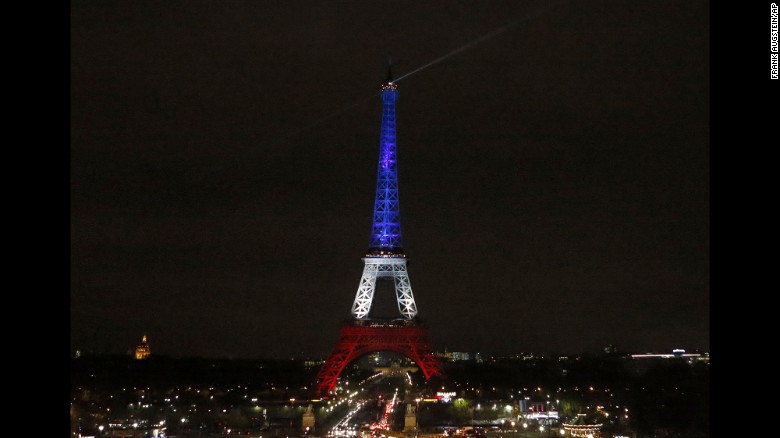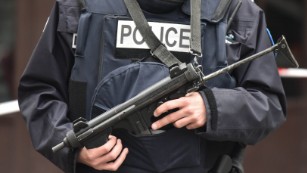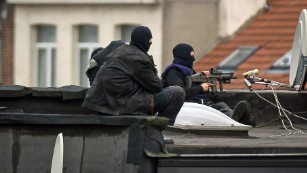
Paris – The prevailing emotion in Paris now is fear.
Fear that anywhere and anyone could be a target.
A sudden noise, and hundreds flee from a square. The air is thick with sirens. Controlled explosions of suspect packages are routine. Public gatherings are banned.
One week after terror attacks took the lives of 130 people in Paris, the French capital is in a somber mood — and the French government is set on revenge.
“France is at war,” declared President Francois Hollande, ordering dozens of airstrikes against ISIS, which claimed responsibility for the attack. The aircraft carrier Charles de Gaulle arrived in the eastern Mediterranean, tripling France’s ability to bomb, and at home sweeping new security powers were introduced.
The contrast with January is striking. Then — after the gun attack on the magazine Charlie Hebdo — the French people rallied with massive demonstrations in defense of free speech.
Charlie Hebdo was targeted for publishing cartoons of the Prophet Mohammed. The response was a celebration of diversity, a coming together of faiths and ethnicities in this most multicultural, but fractious of European societies.
“We can draw anything, including a prophet, because in France, the France of Voltaire and irreverence, we have the right to make fun of religions,” Justice Minister Christiane Taubira said.
The solidarity hashtag #jesuischarlie went viral. A dozen world leaders joined a march through Paris. And sales of Voltaire’s Treatise on Tolerance leapt.
‘Do you trust me?’
Since then the landscape has changed. Tens of thousands of would-be refugees have abandoned Syria and other countries blighted by conflict and trekked north. ISIS has consolidated its hold on vast tracts of Syria and Iraq, and has also shown ever greater ambitions beyond. Its mantra — “remain and expand” — now sounds much more menacing.
Some in France sense an erosion of trust.
One of the lasting images of the past week was that of a man standing blindfolded in the Place de la Republique, where flowers and tributes have been laid.

A sign beside him read: “I’m Muslim, but I’m told that I’m a terrorist. I trust you, do you trust me? If yes, hug me.” A quiet line of people, some in tears, queued to hug him.
But the point was made. In the square where a million gathered after Charlie Hebdo, there was a subdued resignation that the world had changed, most eloquently expressed by one of France’s leading philosophers, Bernard-Henri Levy.
“Each of us, this time, is a target, a frontline, a soldier without knowing it, a cell of resistance,” he wrote.
Shocking security failure
The Charlie Hebdo attack — and that by Amedy Coulibaly against a Jewish supermarket — seemed random acts by individuals who had only loose associations with terrorist groups.
The November attack inflicted 10 times more casualties, showed more sophisticated planning and co-ordination, and deployed suicide vests in addition to automatic weapons.
Above all, it involved terrorists trained and presumably financed in Syria, and infiltrated into Europe.
It was a shocking display of Europe’s failure to track the young men who had left to wage jihad with ISIS and later came home.
More disturbing still, Abdelhamid Abaaoud, whose face and name were well known and who had been involved in at least four plots against France this year alone, had reached the French capital undetected. Only after the attacks did French authorities discover the plotter of the attacks was in Paris, and that thanks to a tip from Morocco.
The Belgian federal prosecutor was candid about the security situation:

“We can hardly keep an eye on people who came back from Syria because there are more than 130 of them,” Eric van der Sypt told CNN.
“You can’t expect judicial authorities or security services to keep an eye on the hundreds of people who have been radicalized and whom you might suspect will go to Syria,” he said.
These security failures, and ISIS’ clear intent to strike Europe, have chastened the French. There are more French citizens associated with ISIS than any other European nation. How many more may have come back?
Slow reforms, immediate threats
There is a palpable anxiety that more episodes of violence will follow, and unease that the reforms and resources promised after January’s attacks did not prevent another just months later.
Anxiety has been heightened by the comments of Prime Minister Manuel Valls that the ISIS threat could extend to chemical and biological weapons. Challenged on this claim, Valls insisted it was important to “know the capacities of this enemy.”
The government will spend nearly $700 million on beefing up the intelligence and police agencies and invest in cyberdetection. According to United States officials, the phones of last week’s attackers were equipped with encryption technology. There is also concern that terror groups are exploiting products like Playstation and Telegram to hide their communications.
But these investments — and reforms of the intelligence services — will take years to bear fruit, and the threat is immediate.
The Socialist government is also demanding better security at Europe’s external borders.
“These individuals took advantage of the refugee crisis … of the chaos, perhaps, for some of them to slip in,” said Valls — crossing multiple borders without detection. Some in the opposition have accused the government of deflecting blame for its own failures by criticizing the border controls of others.
The far-right National Front senses an opportunity. It has warned that the migration crisis will bring terrorism and is hoping to benefit from a “Fortress France” mentality in regional elections in December.
This sense of siege is perhaps best demonstrated by the declaration of a State of Emergency for the next three months, passed almost unanimously by the National Assembly, France’s lower house of Parliament on Thursday.
It gives authorities new search powers and allows for house arrest of individuals for “their behaviors or their acquaintances, their comments or projects.”
Over the course of five nights, nearly 800 searches were conducted and 200 weapons seized.
The targets are invariably in the blighted banlieues that ring many towns and cities, where low-income immigrant communities — especially the young — feel divorced from and disowned by society. They inhabit a world of unemployment, petty crime and weapons. A tiny minority become radicalized, online or in shabby buildings that pass for mosques. The pattern is repeated time and again — in Toulouse, Grenoble, Marseille, Lille and other cities.
On Friday, a neighborhood in the town of Sens south of Paris was placed under curfew for the whole weekend so that police could conduct searches following the discovery of weapons. Local authorities told CNN that the curfew was imposed because authorities “feared trouble to public order.”
An hour’s drive away, in the Place de la Republique, a statue of France’s national symbol, Marianne, looks down on the world’s media.
She holds an olive branch and is surrounded by three statues representing liberty, equality and fraternity. At her feet, for the second time this year, flowers are being laid and prayers said.
They are for the victims — and also, perhaps, for France’s ideals.
As reported by CNN
